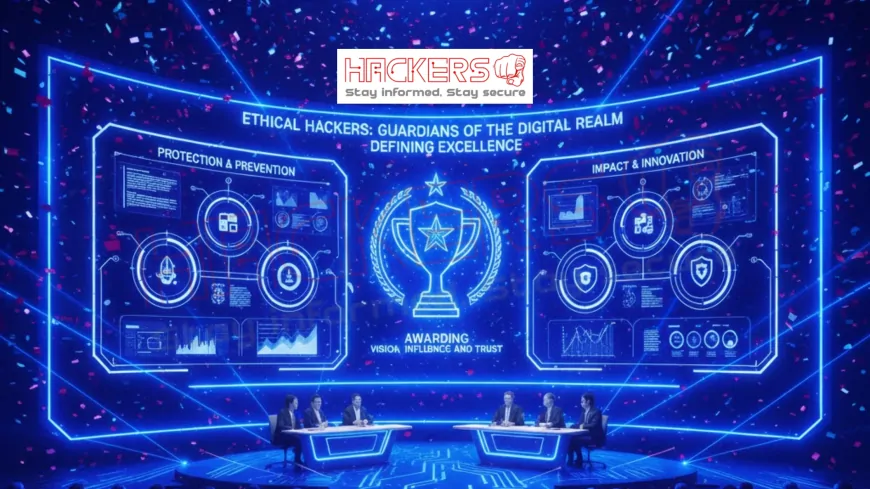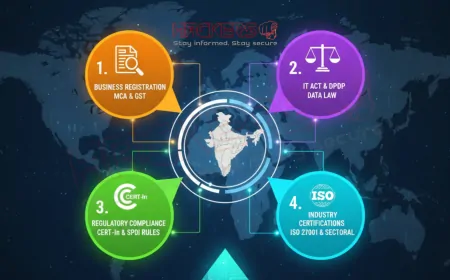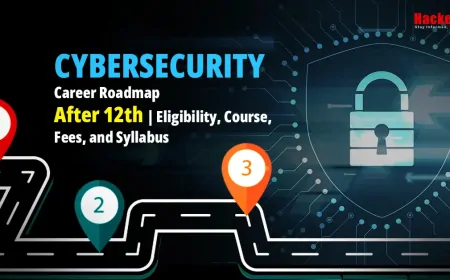Why Ethical Hackers Deserve More Recognition and Awards
At 3:17 a.m., a 22-year-old in a hoodie sits alone in a dark room. Her screen glows with lines of code. She isn’t stealing data. She’s *saving* it. With permission from a major bank, she just found a hidden door that could let criminals walk in and take millions. She reports it. The bank fixes it before anyone notices. The next day, the world moves on. No headlines. No thank-yous. Just another quiet win for an ethical hacker. That’s the life of a white-hat hacker, someone who uses their skills to protect, not harm. In 2025, these digital guardians stop billions in losses every year. Yet they work in the shadows. Their victories are silent. Their names rarely make the news. It’s time that changed. Ethical hackers deserve recognition, awards, and a standing ovation from all of us who rely on safe banking, healthcare, and elections. In this post, we’ll explore who ethical hackers are, what they do, why they’re underappreciated, and how awards can fix that. Whether you’re a parent, a CEO, or a student curious about tech, you’ll see why celebrating these heroes isn’t just fair. It’s smart.

Table of Contents
- Who Are Ethical Hackers?
- What Ethical Hackers Actually Do
- Why They’re Underappreciated
- Current Awards for Ethical Hackers
- Real Impact: Stories That Prove Their Worth
- Why We Need More Recognition and Awards
- How to Support Ethical Hackers Today
- Conclusion
- Frequently Asked Questions
Who Are Ethical Hackers?
Let’s clear up a myth. Hackers aren’t all criminals. There are three types:
- Black-hat hackers: Break in to steal, damage, or extort. Illegal.
- Gray-hat hackers: Find flaws without permission, then ask for payment. Risky.
- White-hat hackers (ethical hackers): Get permission first. Report flaws. Help fix them. Legal and vital.
Ethical hackers come from everywhere. Some are self-taught teens. Others have PhDs. Many start by playing capture-the-flag games online, puzzles that teach hacking skills safely. They earn certifications like Certified Ethical Hacker (CEH) or Offensive Security Certified Professional (OSCP). But the best credential? Real-world results.
In 2025, over 1.2 million people call themselves ethical hackers. They work for bug bounty platforms, security firms, governments, or as freelancers. Their motto: “Think like a criminal to stop one.”
What Ethical Hackers Actually Do
Ethical hacking isn’t movie-style drama with flashing screens. It’s methodical, patient work. Here’s a typical day:
- Scoping: Agree with a company on what systems to test. No touching customer data without rules.
- Recon: Gather public info. Check website code, employee LinkedIn profiles, even trash bins (legally).
- Scanning: Use tools to find open doors, like unsecured servers or weak passwords.
- Exploitation: Try to break in safely. Example: Guess a login, trick a system, or sneak past a firewall.
- Reporting: Write a clear report. “Here’s the hole. Here’s how bad it could be. Here’s the fix.”
- Verification: Confirm the company patched it. Get paid if it’s a bounty.
They don’t just find bugs. They prevent disasters. One ethical hacker in 2025 stopped a hospital ransomware attack by spotting a vulnerable printer. Yes, a *printer*.
Why They’re Underappreciated
Despite their value, ethical hackers face three big hurdles:
- Invisibility: When they succeed, nothing happens. No breach means no news. Failure (a real attack) gets headlines. Success gets silence.
- Legal Gray Areas: Even with permission, some countries treat hacking tools as illegal. One wrong move, and jail time looms.
- Low Pay (Sometimes): Top hackers earn six figures. Many freelancers make $50 per bug. A single report can take 40 hours.
Companies love the results but fear the messenger. “We found your flaw” can feel like blame. Some firms even threaten to sue ethical hackers instead of paying them. That’s backwards.
Worst of all? Burnout. Constant pressure, odd hours, and little praise wear people down. A 2025 survey found 62% of ethical hackers considered quitting due to lack of recognition.
Current Awards for Ethical Hackers
Good news: recognition is growing. Here are 10 awards and programs honoring ethical hackers in 2025.
| Award/Program | Organizer | What It Honors | 2025 Highlight |
|---|---|---|---|
| Pwn2Own | Zero Day Initiative | Live hacking of browsers, phones, cars | $2.1M paid; Tesla hacked in 90 seconds |
| HackerOne Hall of Fame | HackerOne | Top bug reporters by impact | @tomnomnom earned $1.5M lifetime |
| Bugcrowd MVP | Bugcrowd | Most valuable researchers monthly | Indian teen won 6 months in a row |
| DEFCON Black Badge | DEFCON | Capture-the-flag winners | Team PPP won 3rd year running |
| Rising Stars Ethical Hacker | Global Cyber Alliance | Under-30 ethical hackers | Sofia Ramirez fixed smart home flaws |
| Microsoft MSRC Top 100 | Microsoft | Highest impact bug reporters | $13.8M paid in bounties |
| Google VRP Awards | Android and Chrome bug finders | $125K for one critical flaw | |
| Apple Security Bounty | Apple | iOS and macOS researchers | $1M for remote jailbreak |
| CyberPatriot Champion | Air Force Association | High school hacking teams | Texas team won nationals |
| Women in Cyber Honoree | WiCyS | Female ethical hackers | Lila Patel for rural training |
These programs are a start, but they reach only a fraction of the community.
Real Impact: Stories That Prove Their Worth
Let’s meet four ethical hackers who changed lives, quietly.
Sofia Ramirez: The Smart Home Savior
Sofia, 25, loved tinkering with gadgets. She bought a popular baby monitor. Within hours, she found it sent video unencrypted. Anyone nearby could watch. She reported it responsibly. The company patched 10 million units. Parents slept better. Sofia won a Rising Star award and a $50,000 grant.
Ravi Kumar: The Election Protector
Ravi, a 19-year-old student in Mumbai, joined a government bug bounty. He found a voting app flaw that let someone change votes remotely. He reported it in 24 hours. The election stayed secure. He earned $10,000 and a letter from the prime minister. No fame. Just duty.
Team Echo: The Hospital Heroes
Three friends in Brazil tested a hospital network. They found an old server leaking patient records. They could have sold the data. Instead, they alerted admins. The hospital fixed it in a weekend. Lives saved. They split a $15,000 bounty and local news coverage.
Jamal Carter: The Teen Who Stopped a City
Jamal, 17, won CyberPatriot. His school team found a city water system flaw during a practice round. They told officials. A real attack was stopped. The mayor gave them keys to the city. Jamal now has a full college scholarship.
These aren’t exceptions. They’re the rule. Ethical hackers are the immune system of the internet.
Why We Need More Recognition and Awards
Awards do more than stroke egos. They deliver five big benefits:
- Attract Talent: A 2025 study showed 78% of teens would consider cybersecurity if they saw role models win awards.
- Retain Experts: Public praise reduces burnout. One Pwn2Own winner said, “The badge means more than the money.”
- Encourage Reporting: Fear of lawsuits stops some hackers. Awards signal: “You’re valued, not vilified.”
- Build Trust: When companies celebrate finders, not hide flaws, customers feel safer.
- Drive Innovation: Winners share techniques. One bug report can teach thousands.
We need more programs: local awards, school trophies, corporate “Hacker of the Month” boards. Every layer counts.
How to Support Ethical Hackers Today
You don’t need to code. Here’s how anyone can help:
- For Companies: Start a bug bounty. Pay fairly. Thank publicly. Never sue reporters.
- For Schools: Join CyberPatriot. Host hackathons. Invite ethical hackers to speak.
- For Parents: Encourage curiosity. Let kids take apart old routers. Praise problem-solving.
- For Individuals: Follow ethical hackers on LinkedIn. Share their wins. Donate to open-source tools.
- For Governments: Pass safe harbor laws. Fund youth programs. Celebrate national ethical hacker days.
One action can inspire a thousand more.
Conclusion
Ethical hackers are the unsung architects of our digital safety. They work in the dark so we can live in the light. In 2025, they stopped attacks that could have crippled hospitals, stolen elections, and emptied bank accounts. Yet most will never be named.
Awards change that. They turn quiet wins into loud inspiration. They show kids that hacking can be heroic. They keep experts in the field. They build a culture where finding flaws is celebrated, not feared.
We owe ethical hackers more than thanks. We owe them recognition, respect, and a stage. The next time you log in safely, remember: someone out there fought for that moment. It’s time we gave them the spotlight they’ve earned.
Frequently Asked Questions
What is the difference between a hacker and an ethical hacker?
A hacker breaks in. An ethical hacker breaks in with permission to help fix problems.
Is ethical hacking legal?
Yes, when you have written permission from the system owner. Always get it in writing.
How much do ethical hackers earn?
Top pros earn $150,000+ yearly. Bug bounties range from $50 to $1 million per flaw.
Can kids be ethical hackers?
Yes. Programs like CyberPatriot start at age 13. Many teens win awards and scholarships.
Do I need a degree to be an ethical hacker?
No. Skills matter more. Many are self-taught or certified via CEH, OSCP, or practical experience.
What tools do ethical hackers use?
Common ones: Nmap for scanning, Burp Suite for web apps, Metasploit for testing exploits.
How do bug bounty programs work?
Companies list systems. Hackers find flaws. Valid reports earn cash based on severity.
Why do some companies sue ethical hackers?
Fear of bad press. Good companies have safe harbor policies to protect reporters.
Can ethical hackers work remotely?
Yes. Most testing is online. Many are digital nomads or freelancers.
What is Pwn2Own?
A live hacking contest. Winners break software safely and earn big prizes.
How can I start ethical hacking?
Try free platforms: Hack The Box, TryHackMe, or OverTheWire. Learn Linux and networking.
Are there awards for beginner ethical hackers?
Yes. CTF contests, school programs, and junior bug bounties honor new talent.
Do ethical hackers ever go to jail?
Rarely, if they follow rules. Always get permission. Avoid gray-hat actions.
Why don’t we hear more about ethical hackers?
Their wins prevent news. A fixed flaw means no headline, but a safer world.
Can girls be ethical hackers?
Absolutely. Women like Sofia and Lila win major awards and lead the field.
How do awards help the cybersecurity field?
They attract talent, reduce burnout, encourage reporting, and share knowledge.
What is a CTF in hacking?
Capture The Flag. A game where teams solve security puzzles to find hidden “flags.”
Do ethical hackers work for governments?
Yes. Many protect national infrastructure, elections, and military systems.
Can I report a bug anonymously?
Some platforms allow it. But named reports often earn higher pay and recognition.
Why should we celebrate ethical hackers?
They stop harm before it starts. Recognition keeps them motivated and inspires others.
What's Your Reaction?










































































